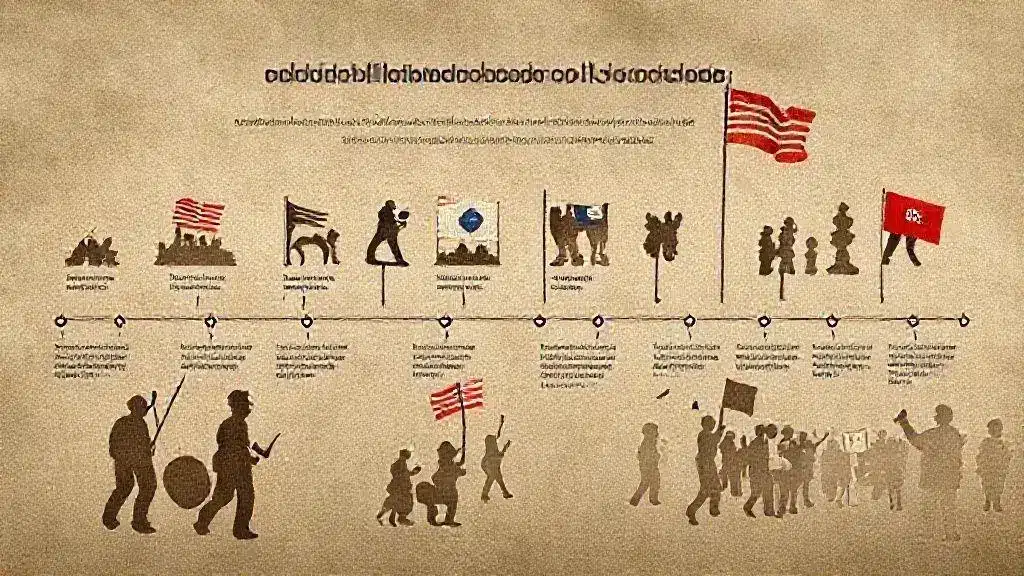Political polarization in the US and its effects

Political polarization in the US leads to significant impacts on social interactions, causing increased tension in conversations and affecting relationships due to deeply divided beliefs and heightened conflicts.
Political polarization in the US affects our daily lives in ways we might not realize. From family dinners to workplace discussions, how do these divides shape our interactions? Let’s dive into this pressing issue.
Understanding political polarization
Understanding political polarization is essential to grasping current societal dynamics. It reflects the growing divide between different political beliefs, leading to significant impacts on how we communicate and connect with each other.
The roots of political polarization stretch back many years, but factors like partisanship, media influence, and social identity continue to shape it today. An essential aspect is recognizing how political views are often tied to personal identity, which makes discussions challenging.
Historical Context
Throughout U.S. history, there have been moments of intense division, from the Civil War to the Civil Rights Movement. These events highlight how polarization can influence societal structures and norms.
Key Factors Contributing to Polarization
- Media Influence: Different media outlets may present biased information, reinforcing existing beliefs.
- Social Media: Online platforms can create echo chambers, isolating users from opposing views.
- Political Rhetoric: Language used by leaders often intensifies divisions, framing issues in black-and-white terms.
Beyond just political opinions, polarity affects relationships. Friends, families, and coworkers can find themselves at odds, even over casual discussions. This tension can make it hard to connect with those holding opposing views.
As people encounter differing opinions, they may feel threatened or defensive. This can lead to deeper divides, pushing individuals further into their ideological corners.
Being aware of political polarization is the first step toward fostering better dialogues. Finding common ground and respecting differing perspectives can help bridge the gaps. It’s crucial to engage in conversations with empathy, aiming to understand rather than to win arguments.
Historical roots of division

The historical roots of division in the United States run deep, affecting how people view politics today. Various events and movements have contributed to the current state of political polarization.
From the founding of the nation, disagreements over governance and rights created factions. The tensions grew during the early years, particularly with issues like slavery and states’ rights, eventually leading to the Civil War.
The Role of the Civil War
The Civil War (1861-1865) marked a significant turning point in U.S. history. It entrenched divisions between the North and the South. After the war, many found it hard to reconcile their differences. However, this period also laid the groundwork for future discussions about civil rights.
Impact of the Civil Rights Movement
The Civil Rights Movement of the 1950s and 1960s was another major factor in shaping current divisions. This era challenged systemic racism and pushed for equality, but it also ignited fierce opposition. As a result, many individuals became more entrenched in their political views.
During the late 20th century, shifts in party ideologies further fueled polarization. The Democratic and Republican parties began to attract different demographics based on social and cultural issues. This realignment created a scenario where political identity became closely tied to personal beliefs and values.
Understanding these historical roots is crucial for recognizing why today’s discussions can often become heated. Events from the past continue to echo in our societal debates, highlighting the need for empathy and clarity when navigating conversations around political polarization.
Effects on social interactions
The effects of political polarization on social interactions are profound and widespread. As people engage in discussions about politics, divisions can emerge, affecting relationships in everyday life.
When individuals hold strong political beliefs, it can lead to tension in personal and professional settings. Discussions at family gatherings or among friends can quickly become heated, as differing views create discomfort. The fear of conflict can cause people to avoid these topics altogether.
Challenges in Communication
Effective communication becomes more challenging when political views differ. Misunderstandings may arise, and listening can take a backseat to arguing. This often leads to a breakdown in dialogue, making it difficult to find common ground.
Impact on Friendships
Friendships may suffer due to political polarization. Close friends might find themselves reevaluating their relationships if they disagree strongly on core beliefs. Some may distance themselves from others whose views they disapprove of, creating social rifts.
- Emotional Stress: Engaging in contentious conversations can increase stress levels.
- Isolation: Those feeling marginalized may withdraw from social groups.
- Group Identity: People may align themselves more with like-minded individuals, reinforcing divides.
Social media has also intensified these challenges. Online platforms often amplify extreme viewpoints and can create echo chambers, where individuals only interact with those who share similar beliefs. This can foster feelings of hostility towards differing opinions, making offline interactions more strained.
Understanding these dynamics is crucial for healthier engagements. Being aware of the impact of political polarization on our interactions can help us approach conversations with more empathy and openness.
Navigating conversations in a polarized society

Navigating conversations in a polarized society can be challenging. With strong opinions on both sides, finding common ground requires skill and patience. It is crucial to approach discussions with an open mind and respect for differing views.
One effective strategy is to listen actively. When engaging with someone who has opposing beliefs, take the time to understand their perspective. This can foster a more constructive dialogue. Rather than immediately countering their points, ask clarifying questions that show you are interested in their viewpoint.
Strategies for Effective Dialogue
Here are some useful tips for having more productive conversations:
- Stay Calm: Maintain a peaceful demeanor, even when discussions get heated.
- Avoid Name-Calling: Focus on ideas, not personal attacks. This can help keep the conversation respectful.
- Use “I” Statements: Express your feelings and thoughts without blaming the other person. For example, say, “I feel that…” rather than “You always…”.
Additionally, finding topics of mutual interest can help bridge the divide. You might share common values such as family, community, or fairness. Highlighting these areas can make discussions feel less adversarial and more collaborative.
It can also be beneficial to agree on boundaries. If certain topics lead to arguments, it may be wise to set limits on those discussions. This helps create a safer environment where both parties can express themselves without fear of conflict.
Recognizing the emotional side of political discussions is key as well. People may not just hold opinions; they often hold passionate beliefs tied to their identities. Being sensitive to these feelings can promote compassion and empathy in your conversations.
FAQ – Questions About Political Polarization and Social Interactions
What is political polarization?
Political polarization refers to the growing divide in opinions and beliefs between different political parties or groups, often leading to heightened conflict.
How does political polarization affect communication?
It makes conversations more challenging, as individuals may feel less inclined to listen and understand opposing viewpoints, leading to misunderstandings and conflict.
What strategies can help in navigating difficult political discussions?
Strategies include listening actively, staying calm, avoiding personal attacks, and finding common ground to foster respectful dialogue.
Why is empathy important in discussions about politics?
Empathy allows individuals to understand emotional connections tied to political beliefs, promoting a more compassionate and constructive conversation.





